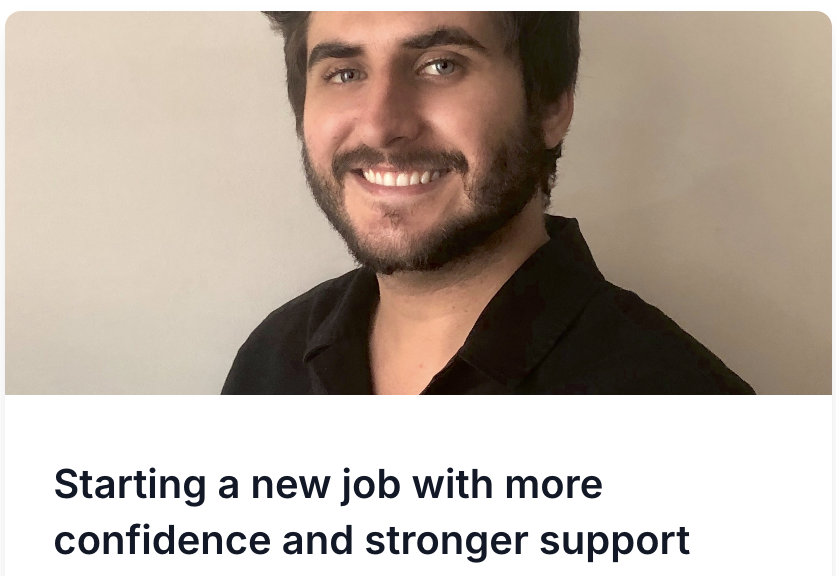Helpful summary
Why you can trust us: Success stories, like Nelson Remetz's transition guided by Kristen Leake, and Hon Tjuin's team upskilling, showcase our platform's ability to deliver significant results through tailored team mentorship.
Why this is important: Team mentorship fosters a culture of shared knowledge, collaborative problem-solving, and continuous learning, crucial for any team's success.
Action Points: We encourage teams looking for growth and overcoming obstacles to explore MentorCruise for mentorship that aligns with their collective goals.
Further Research: Teams ready to embark on a mentorship journey should consider our platform for access to a diverse pool of mentors, ready to guide teams toward success.
Need help with team mentoring?
If your team is struggling with a big project and a looming deadline, this causes stress for everyone. Team mentoring can guide your team through the toughest challenges at work and teach you new strategies to overcome them.
MentorCruise recognizes the power of leveraging collective knowledge and experience to push teams forward. Our platform pairs teams with mentors with the necessary skills and experience to improve team performance and meet deadlines.
In this article, we'll dive into the concept of team mentoring, exploring its benefits, best practices, and how it can be a game-changer in achieving your team's objectives.
Why listen to us?
At MentorCruise, we excel in elevating teams towards their collective milestones through dedicated team mentorship. We pair teams with mentors whose expertise resonates with the team's specific objectives, fostering an environment perfect for communal growth and achievement.
From Miky Bayankin's guidance on product development to Kristen Leake's support in UX design career transitions, our mentorship stories underscore the transformative impact of our approach. Our platform is a testament to the power of shared knowledge, collaborative problem-solving, and the proven benefits of our mentoring structure on team dynamics and performance.
What is team mentoring?
Team mentoring involves a group of people with various skills and knowledge coming together to learn from each other and one or more experienced mentors. It's different from one-on-one mentoring because it allows for group discussions, learning, and peer mentoring.
In team mentoring, the focus is on collective growth and problem-solving rather than daily tasks. Mentors lead the discussions, but all members contribute, fostering a supportive community focused on mutual learning and advancement.
Why does your team need team mentoring?
Expanded knowledge base
In team mentoring, everyone has something to offer. Someone might be great with technology, another with business strategy, and someone else knows how to communicate with clients. By sharing these skills, the whole team gets smarter and more capable.
Consider having a mentor like Miky Bayankin, an entrepreneur, startup founder, and product manager. His expertise can undoubtedly facilitate team growth and impart valuable insights on product development, business operations, and effective people leadership.

Miky is particularly valuable for novice founders and startup teams in the early stages of product development or navigating their launch phase.
Enhanced problem-solving
When the team faces a tough issue, having different points of view can be a huge help. Instead of just one mentor offering a solution, everyone can chip in with ideas. This can lead to finding new and better ways to get things done that no one person might have thought of alone.
Building support network
Team mentoring is about more than just learning; it's about building relationships. It creates a group of people who have your back, who you can turn to for advice or help, not just during the mentoring sessions but even after they're over.
At MentorCruise, our mentors serve as stable partners for teams at all stages of their career paths. Whether aiming for promotions, embarking on big projects, or building confidence and team dynamics, our mentors offer unwavering support.

Take Nelson Remetz's transition from architecture to UX design as an example. With Kristen Leake as his mentor, he gained invaluable dedicated time with an expert. Kristen provided insightful feedback and served as a sounding board for his ideas. Moreover, she assisted Nelson in refining his product and portfolio for interviews, significantly improving his performance.
Accelerated learning
Learning as a team allows you to progress more quickly. When one team member learns something new from their mentor, they can share it with the rest, helping the entire team advance together without waiting for each person to catch up individually.
For example, Hon Tjuin managed to upskill his early employees and founding team members with the help of mentors from MentorCruise.

He effectively reinforced his team's capabilities without the need to recruit additional employees. By implementing team mentoring, he equipped his existing team with the necessary expertise and guidance to deliver outstanding results.
Improved communication
Team mentoring boosts your skill in sharing knowledge and sharpens your communication abilities. In this setting, you learn to express your ideas clearly and listen attentively to others. Practicing these skills in a group helps you better articulate your thoughts and grasp your colleagues' ideas. Good communication is essential in any workplace, making this a significant benefit.

Let’s take a look at Mónica’s experience as an example. Throughout her mentorship with Gonçalo Palma, she not only mastered Flutter (a necessary skill for software engineers), but she also gained confidence in her abilities. This newfound self-assurance led her to communicate more effectively with her team members, leading to better teamwork and efficiency.
How to do effective team mentoring
To make team mentoring work well, it's important to set clear goals, foster a supportive atmosphere, and promote open communication. Mentors can use their experience to lead discussions, make sure everyone is heard, and maintain the team's focus on shared goals.
1. Define the purpose and objectives
Before starting, clearly outline what the team mentoring program aims to achieve. Consider the specific skills or knowledge the team needs to develop. These goals will guide the structure of the mentoring sessions and help in measuring the program's success.
2. Engage key stakeholders and gather buy-in
Make sure everyone who needs to approve or participate in the mentoring program understands its value. This may include upper management, HR, or team leads. Their support will be crucial for providing resources and encouraging participation.
3. Design the program structure
Plan how the mentoring will be integrated into the team’s routine. Define the frequency of meetings, the duration of the program, and the method of communication, whether in-person or virtual. A well-thought-out structure ensures that mentoring sessions are productive and fit seamlessly with other work commitments.
3. Select mentors and recruit mentees
Choose mentors who have the expertise and the right interpersonal skills to guide a group. For a diverse selection of potential mentors, MentorCruise offers a platform with experienced professionals ready to help. Once mentors are in place, gather a group of mentees—team members who are committed to learning and contributing to the mentoring process.
4. Match mentors and mentees
Create pairs or small groups that align mentors’ strengths with mentees' learning needs. Consider personality and learning styles to ensure a good fit and a positive, collaborative environment for all participants.
5. Monitor and support
Keep track of the program's progress and address any issues as they arise. Provide support by offering resources, facilitating discussions, and ensuring that mentors and mentees are actively engaging with each other. Regular check-ins help sustain momentum and keep the program on track.
6. Evaluate, adjust, and iterate
Regularly assess the effectiveness of the team mentoring program. Collect feedback from participants to understand what's working and what isn't. Use this information to make necessary adjustments, improving the program iteratively over time to better meet the team's needs and goals.
Best practices in team mentoring
To maximize the benefits of team mentoring, it's essential to adhere to some best practices. These methods ensure that the mentoring process is effective, enjoyable, and valuable for all participants. Here are key best practices to keep in mind for a successful team mentoring program:
- Clear communication: Set up a system for mentors and mentees to share information and feedback easily. Make sure everyone knows how and when to communicate.
- Defined roles and responsibilities: Clarify what is expected from mentors and mentees. Everyone should understand their role in the mentoring process.
- Confidentiality agreement: Build trust by ensuring that discussions within the mentoring sessions remain private. Agreeing to confidentiality encourages open and honest communication.
- Regular scheduling: Consistency is key. Schedule regular sessions and stick to them so that mentoring becomes a routine part of the team's workflow.
- Goal setting: Encourage mentors and mentees to set specific, measurable goals at the start. This provides direction and a way to track progress.
- Feedback loop: Create a process for mentors, mentees, and program organizers to give and receive feedback about the mentoring. This helps to continuously improve the experience for current and future participants.
Ready to start your team mentoring program?
Team mentoring is a powerful tool for unlocking a team's full potential. By fostering a culture of shared knowledge, collaborative problem-solving, and continuous learning, teams can overcome obstacles more effectively and reach their goals with confidence. Remember, the success of team mentoring hinges on clear objectives, active participation, and a willingness to adapt and grow together.
If your team is ready to take on the challenge and reap the benefits of team mentoring, MentorCruise is here to help. Our platform offers access to a diverse pool of mentors with the expertise to guide your team. Don't let stress and uncertainty hold your team back. Visit MentorCruise today to find the right mentor for your team's journey toward success.







